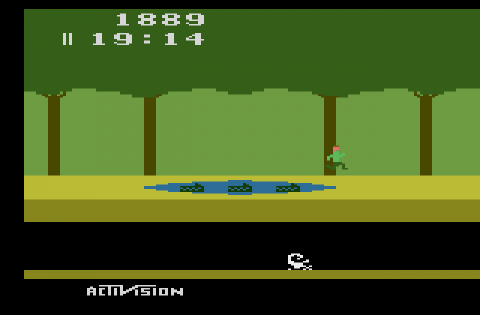As somebody who is determined to enter the video game industry from the design side, I spend a great deal of my life thinking and talking about games. The conclusion that I have reached, which I think is a relatively common one, is that there is little agreement about what video games are. When the medium was born, it was fairly clear. A video game was a challenge completed by interaction between a player and a computer. As technology and design have become more complex we have seen some people retain this definition, but the vast majority of people who have put some thought into it have come up with rather more complex sense of what video games are. Today I intend to put my definition up for examination, and to look at the relationship between players and designers that this should ideally lead to.
My Definition of a Video Game

Well, to begin with the term “video game” is an extremely underdeveloped one. I equate it to the term movie, which really just means “moving picture.” Movies are more than moving pictures, and video games are more than electronic games. However, I really don’t see any need to develop a new term so long as we can all agree that our definition of “video game” need not be tethered to the discussion about what constitutes a “game.” It is for precisely that reason that I’m not even going to get into trying to define what a game is, a fool’s errand.
In my mind, a video game is not the actual software being run by a computer. Rather, it is the experience that said game creates in the player’s mind. This sounds strange, but we can get a clearer picture of it if we consider a game to only exist while it is being played.
Consider the lily. I mean, sorry, where was I…right, consider some RAM with a piece of software written to it. Under some definitions, that piece of software is a video game. Under my definition, that is only the software component of a video game. When a player begins interacting with that software, the game is constituted by the entire system of software, player, and the devices through which they interact.
At this point it is not unreasonable to be sceptical that I am just dealing in semantics, but I have good reason for proposing this definition. The software of a game is ultimately a set of rules. Under the early definition of video games that I mentioned earlier, a set of rules constitute a challenge and it is therefore reasonable to call the software itself a video game. The problem comes from the fact that video games now consist of things that do not have inherent meaning to the machine that they are running on, but which drastically alter the player experience. A computer does not understand the significance of something occurring in a cutscene, but the player does. Therefore, when we refer to a game has having emotional impact we are really referring to the whole experience as having an emotional impact. I do not think it’s unreasonable to propose that we consider the game to be the experience of interacting with the software, and not the software itself.
This new definition does not just encompass games that break the simple “challenge” formula. Attempting a challenge is, in itself, an experience. This is why we can have preferences for challenge-based games. If engaging a challenge were not an experience, then we would have no basis to say that we enjoyed one challenge and not another.
Responsibilities
This new definition need not change the normal way that we discuss games. It does, however, change the way that we should design and interact with them. I think that both players and designers have certain responsibilities to each other that wouldn’t necessarily be apparent when considering games as mere challenges or pieces of software.
Of the Designer
The responsibilities of the designer stem from the fact that players are, in some sense, making themselves quite emotionally vulnerable when they suspend disbelief, interact with the designer’s system, and create the video game. This is true of most art, but the interactive nature of games has the potential to take this vulnerability even further than is typical. If designers do not respect this vulnerability, then they risk violating that trust. These are not tips for making good games, these are moral responsibilities.
1.Games should never demand that the player think outside of established confines. Players need to suspend their disbelief to play a game. As such, they are deliberately choosing to filter out certain information, and sometimes solutions to puzzles. For example, in Fable 3 the player must leave the software running idly for hours if they wish to get the best ending. By forcing the player to introduce a system from outside of the software (in this case walking away for a period of time) the game destroys the experience and punishes players who are trying to play along with the designer. It is worth noting that there are no mechanics which are off-limits, but a designer cannot suddenly broaden a game’s scope to include something like real-world time unless they deliberately justify it to the player as being an acceptable way of thinking about the game.
2.Games should not “addict” the player.

This one seems likely to be controversial, because many very popular games do it. Regardless, I maintain that games which literally addict the player are unethical. Take the analogy of a friend inviting you over for coffee and secretly slipping nicotine in it. I fail to see any significant difference between the two situations. Addiction in some games (such as WoW, CoD and Diablo…hi Acti-Blizzard…) is chemically similar in the brain to drug addiction. Player’s should not be expected to defend themselves from this type of permanent harm from a game designer that they have entrusted with their minds.
Of the Player
The player has only one responsibility: to submit to the game designer and engage with the software. If they do not do this, then the designer can no longer be held responsible for the player’s experience. This is why designers need not spend much time reigning in players who are deliberately breaking their experience. If Video Games are the interactive experience, and not just the software, then the designer and player must work together to produce a good one.
To take that high level concept to something more manageable, here are a few ways that the player is responsible for engaging with the software.
1. Players should approach all games in a “mechanical vacuum.”
Game players are often guilty of not enjoying games because they expect them to be something that they were never intended to be. While a gamer cannot be expected to wipe themselves clean before they start every new game, they are at least responsible for approaching each game as an individual set of components that can and should behave differently from other games. If a game does not include a common mechanic, or introduces a weird one, the player should not simply dismiss it without observing the entire system in motion. For example, many people complained about how players could not use both a gun and a flashlight at the same time in Doom 3. This was a problem of players projecting what they expected the game to and not considering what it was trying to be. If players assume that a game is going to behave a certain way, designers are limited in what they can do to provide a new and engaging experience.
2. Players should not approach all games as “play to win” experiences.
Many, if not most, modern games are designed to make the player feel like they are doing something. If the player spends all of their time trying to find the most effective route through the game, they risk missing the more rewarding experience that the designer has tried to create. The onus is on the designer to ensure that the player knows how to get the best experience out of the game, but they can only open the door. The player must walk through it.
3. Before regarding a game as “bad” the player should consider how the pieces fit together.
Even though I do not like Bioshock, I would never refer to it as a bad game. This is because all of the pieces fit together in an intellectually compelling way, and it is possible to imagine somebody enjoying the experience (as many people obviously do). Simply understanding that it was well put together made the experience more enjoyable. Different people will react to games in different ways, and it is unreasonable to expect that any game will provide all players with a great experience.
There are certainly more responsibilities along these lines that are created by the “designer>software>interface>player” chain which constitutes a video game. My goal here is simply to introduce the way that I think about video games as a whole, not to exhaustively express it.
Thankyou for your time
Adrian Hall
Log in to comment